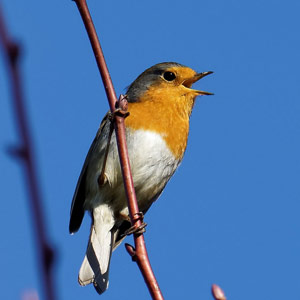Pratique | Débuter
Pourquoi certains oiseaux chantent-ils en hiver ?

Rougegorge familier (Erithacus rubecula) chanteur, La Beylie (Corrèze), le 6/11/2015.Photographie : Jean Morillon
Introduction
Les oiseaux chantent principalement au printemps et en été, aussi en hiver, les bois et les jardins sont généralement silencieux. Toutefois, en décembre et en janvier, on peut entendre le chant cristallin et un peu mélancolique du Rougegorge familier, y compris à l’aube et au crépuscule, quand il fait encore nuit. Dès janvier, d’autres espèces comme la Grive musicienne recommencent à chanter, surtout quand il fait beau. L’on sait aussi que plusieurs espèces migratrices qui hivernent en Afrique, comme les Rousserolles verderolle et turdoïde, chantent régulièrement. Mais pourquoi chanter durant la mauvaise saison, quand il n’y a pas de femelles à séduire et qu’il serait plus raisonnable d’économiser de l’énergie pour accumuler des réserves ? Dans cet article, nous recensons les raisons possibles.
Abstract
Birds sing mainly in spring and summer, and in winter, woods and gardens are generally silent. However, in December and January, we can hear the crystalline and somewhat melancholy song of the familiar Eurasian Robin, including at dawn and dusk, when it is still dark. And by the end of January, other species such as the Song Thrush begin to sing again, especially when the weather is sunny. And it is also known that several migratory species that overwinter in Africa, such as the Marsh and Great Reed Warblers, sing regularly in their wintering grounds. But why singing during the postnuptial season, when there is no female to seduce and when it would make more logical to save energy to accumulate reserves? In this article, we identify the possible reasons.
Poursuivez la lecture de cet article, en vous abonnant dès maintenant !
Découvrez les Archives d’Ornithomedia.com
Pour seulement 10,00 €TTC/an (ou 6,00 € les 6 mois)
Profitez de plusieurs centaines d’articles en accès illimité et sans aucun engagement.
Compléments
À lire aussi sur Ornithomedia.com
- Pourquoi certains oiseaux crient-ils et/ou chantent-ils la nuit ?
- Pour s’adapter au bruit, le rougegorge doit « prendre de la hauteur »
- Faites moins de bruit et vous verrez plus d’oiseaux en ville
- Les Grands-ducs d’Europe chantent davantage lors des nuits de pleine lune
- Comment les oiseaux supportent-ils les nuits d’hiver et comment les aider ?
Dans la boutique d’Ornithomedia.com
Sources
- Marjorie C. Sorensen, Susanne Jenni-Eiermann et Claire N. Spottiswoode (2016). Why Do Migratory Birds Sing on Their Tropical Wintering Grounds? The American Naturalist. Volume : 187. Numéro : 3. Mars. http://www.journals.uchicago.edu/doi/abs/10.1086/684681
- Marjorie C. Sorensen (2014). Singing in Africa: no evidence for a long supposed function of winter song in a migratory songbird. Behavorial Ecology. beheco.oxfordjournals.org/content/25/4/909.short
- Kathleen E Hunt, Thomas P Hahn, John Wingfield (1997). Testosterone implants increase song but not aggression in male Lapland longspurs. Animal behaviour. Volume : 54. Numéro : 5. Pages : 1177–1192. www.sciencedirect.com/science/article/pii/S0003347297905583
- Mariano Cuadrado (1997). Why are migrant Robins (Erithacus rubecula) territorial in winter?: the importance of the anti-predatory behaviour. Ethology Ecology & Evolution. Volume : 9. Numéro : 1.
Pages 77-88. www.tandfonline.com/doi/abs/10.1080/08927014.1997.9522904 - M. G. Kelsey (1989). A comparison of the song and territorial behaviour of a long-distance migrant, the Marsh Warbler Acrocephalus palustris, in summer and winter. Ibis. http://onlinelibrary.wiley.com/doi/10.1111/j.1474-919X.1989.tb02788.x/abstract
- C. J. Alexander. Observations of birds singing in their winter quarters and on migration. British Birds. www.britishbirds.co.uk





 1 commentaire
1 commentaire
1 commentaire(s) sur ce sujet
Participer à la discussion !Joël FIEVRE
Saint-Nazaire
Posté le 10 février 2017
Bonjour,
?! Vous ne citez pas l’accenteur mouchet.
Il chante aussi l’hiver quelques fois en janvier dans mon jardin en Loire-Atlantique.
Cordialement.